Thesaurus : Doctrine

► Full Reference: M. Torre-Schaub, "La compliance environnementale et climatique" ("Environmental and Climate Compliance"), in M.-A. Frison-Roche (dir.), L'Obligation de Compliance, Journal of Regulation & Compliance (JoRC) and Dalloz, coll. "Régulations & Compliance", to be published
____
📕lire une présentation générale de l'ouvrage, L'Obligation de Compliance, dans lequel cet article est publié
____
► Summary of this contribution (done by the Journal of Regulation & Compliance) : The author starts from the fact that Compliance Law, in that it is not limited to conformity process, and Environmental Law are complementary, both based above all on the prevention of risks and harmful behaviour, environmental crises and the right to a healthy environment involving the strengthening of Environmental Vigilance. It is all the more important to do this because definitions remain imprecise, not least those of Environment and Climate, which are diffuse concepts.
Firstly, the contribution sets out the purpose of Environmental Compliance, which is to ensure that companies are vigilant with regard to all kinds of risks: they put in place and follow a series of processes to obtain "progress" in accordance with a standard of "reasonable vigilance". This requires them to go beyond mere conformity and encourages them to develop their own soft law tools within a framework of information and transparency, so that the climate system itself benefits in accordance with its own objectives.
Then the author stresses the preventive nature of Environmental Vigilance mechanisms, which go beyond providing Information to managing risks upstream, in particular through the vigilance plan, which may be unified or drawn up risk by risk, and which must be adapted to the company, particularly in the risk mapping drawn up, with assessment being carried out on a case-by-case basis.
Lastly, in the light of recent French case law, the author describes the implementation of the system, which may bring the parties before the Tribunal judiciaire de Paris (Paris Court of First Instance) and then the specialised chamber of the Paris Court of Appeal. The author believes that judges must clarify the obligation of Environmental Vigilance so that companies can adjust to it, and these 2 courts are in the process of doing so.
____
🦉This article is available in full text to those registered for Professor Marie-Anne Frison-Roche's courses
________
Thesaurus : Doctrine
► Référence complète : B. Lecourt, "Des obligations d'information en matière de droit de l'homme et d'environnement au devoir de vigilance", in B. Lecourt (dir.) Lebvre - Dalloz, coll. "Thèmes et commentaires", 2025, pp
____
📗lire une présentation générale de l'ouvrage, Le devoir européen de vigilance, dans lequel cet article est publié
____
🦉Cet article est accessible en texte intégral pour les personnes inscrites aux enseignements de la Professeure Marie-Anne Frison-Roche
________
Thesaurus : Doctrine
► Référence complète : A.-M. Ilcheva, "Condamnation de Shell aux Pays-Bas : la responsabilité climatique des entreprises pétrolières se dessine", D. 2021, pp. 1968-1970
____
► Résumé de l'article : Après une brève description de l'affaire en cause au principal, l'auteure explicite dans un premier les fondements du jugement dit "Shell". Elle explique que l'action engagée était fondée sur le droit de la responsabilité civile délictuelle néerlandais, plus précisément le "duty of care" de l'article 6:162 du code civil néerlandais, lequel amène le juge, afin d'établir le fait générateur, à apprécier le comportement de l'entreprise défenderesse au regard du standard de comportement de la personne prudente et raisonnable. Sont également mobilisés par le juge des travaux scientifiques (rapport du GIEC), des normes de droit international (CEDH) et des normes de droit souple (Principes directeurs de l'ONU), afin de caractériser tant le fait générateur que le dommage (notamment futur). Dans un second temps, l'auteure envisage la portée de ce jugement, frappé d'appel au moment de la rédaction de son article. Elle souligne que le juge s'est appuyé sur la notion d'entreprise, permettant ainsi de contourner l'obstacle traditionnel lié à la personnalité morale, et qu'il a retenu ici une responsabilité préventive, tournée vers le futur. Elle termine en mettant en avant les conditions nécessaires pour que ce jugement soit effectif et constate que l'effort demandé à l'entreprise est plus important que celui préconisé par les rapports d'experts.
____
🦉Cet article est accessible en texte intégral pour les personnes inscrites aux enseignements de la Professeure Marie-Anne Frison-Roche
________
Thesaurus : Doctrine

► Full Reference: M. Torre-Schaub, "Environmental and Climate Compliance", in M.-A. Frison-Roche (ed.), Compliance Obligation, Journal of Regulation & Compliance (JoRC) and Bruylant, "Compliance & Regulation" Serie, to be published
____
📘read a general presentation of the book, Compliance Obligation, in which this article is published
____
► Summary of the article (done by the Journal of Regulation & Compliance - JoRC):
The author starts from the fact that Compliance Law, in that it is not limited to conformity process, and Environmental Law are complementary, both based above all on the prevention of risks and harmful behaviour, environmental crises and the right to a healthy environment involving the strengthening of Environmental Vigilance. It is all the more important to do this because definitions remain imprecise, not least those of Environment and Climate, which are diffuse concepts.
Firstly, the contribution sets out the purpose of Environmental Compliance, which is to ensure that companies are vigilant with regard to all kinds of risks: they put in place and follow a series of processes to obtain "progress" in accordance with a standard of "reasonable vigilance". This requires them to go beyond mere conformity and encourages them to develop their own soft law tools within a framework of information and transparency, so that the climate system itself benefits in accordance with its own objectives.
Then the author stresses the preventive nature of Environmental Vigilance mechanisms, which go beyond providing Information to managing risks upstream, in particular through the vigilance plan, which may be unified or drawn up risk by risk, and which must be adapted to the company, particularly in the risk mapping drawn up, with assessment being carried out on a case-by-case basis.
Lastly, in the light of recent French case law, the author describes the implementation of the system, which may bring the parties before the Tribunal judiciaire de Paris (Paris Court of First Instance) and then the specialised chamber of the Paris Court of Appeal. The author believes that judges must clarify the obligation of Environmental Vigilance so that companies can adjust to it, and these 2 courts are in the process of doing so.
____
🦉This article is available in full text to those registered for Professor Marie-Anne Frison-Roche's courses
________
March 17, 2025
Thesaurus : Doctrine
► Référence complète : S. Hoynck, "La Charte de l'environnement et l'office du juge administratif. Une transition juridique en marche ?", AJDA, 17 mars 2025, n° 10, pp. 472-478
____
► Résumé de l'article (fait par l'auteur) : "Lorsqu'on s'interroge sur l'office du juge, on peut faire un constat, purement quantitatif, de l'application de la Charte par le Conseil d'Etat, vingt ans après son entrée en vigueur. Elle n'apparaît ni hégémonique ni centrale dans le contentieux administratif de l'environnement. Plusieurs explications peuvent être avancées, tenant à la place du droit de l'Union européenne dans le droit de l'environnement et au processus même de constitutionnalisation du droit de l'environnement. Ces explications ne viennent pas invalider l'importance que revêt la charte pour la construction, jamais achevée, du droit administratif de l'environnement.".
____
🦉Cet article est accessible en texte intégral pour les personnes inscrites aux enseignements de la Professeure Marie-Anne Frison-Roche
________

Nov. 26, 2024
MAFR TV : MAFR TV - Overhang

🌐suivre Marie-Anne Frison-Roche sur LinkedIn
🌐s'abonner à la Newsletter MAFR. Regulation, Compliance, Law
🌐s'abonner à la Newsletter Surplomb, par MAFR
____
► Référence complète : M.-A. Frison-Roche, "Compliance, Climat, Dommage, Science et Vérité - Cour d'appel de La Haye, 12 novembre 2024", in série de vidéos Surplomb, 26 novembre 2024
____
🌐visionner sur LinkedIn cette vidéo de la série Surplomb
____
____
🎬visionner ci-dessous cette vidéo de la série Surplomb⤵️
____
Surplomp, par mafr
la série de vidéos dédiée à la Régulation, la Compliance et la Vigilance
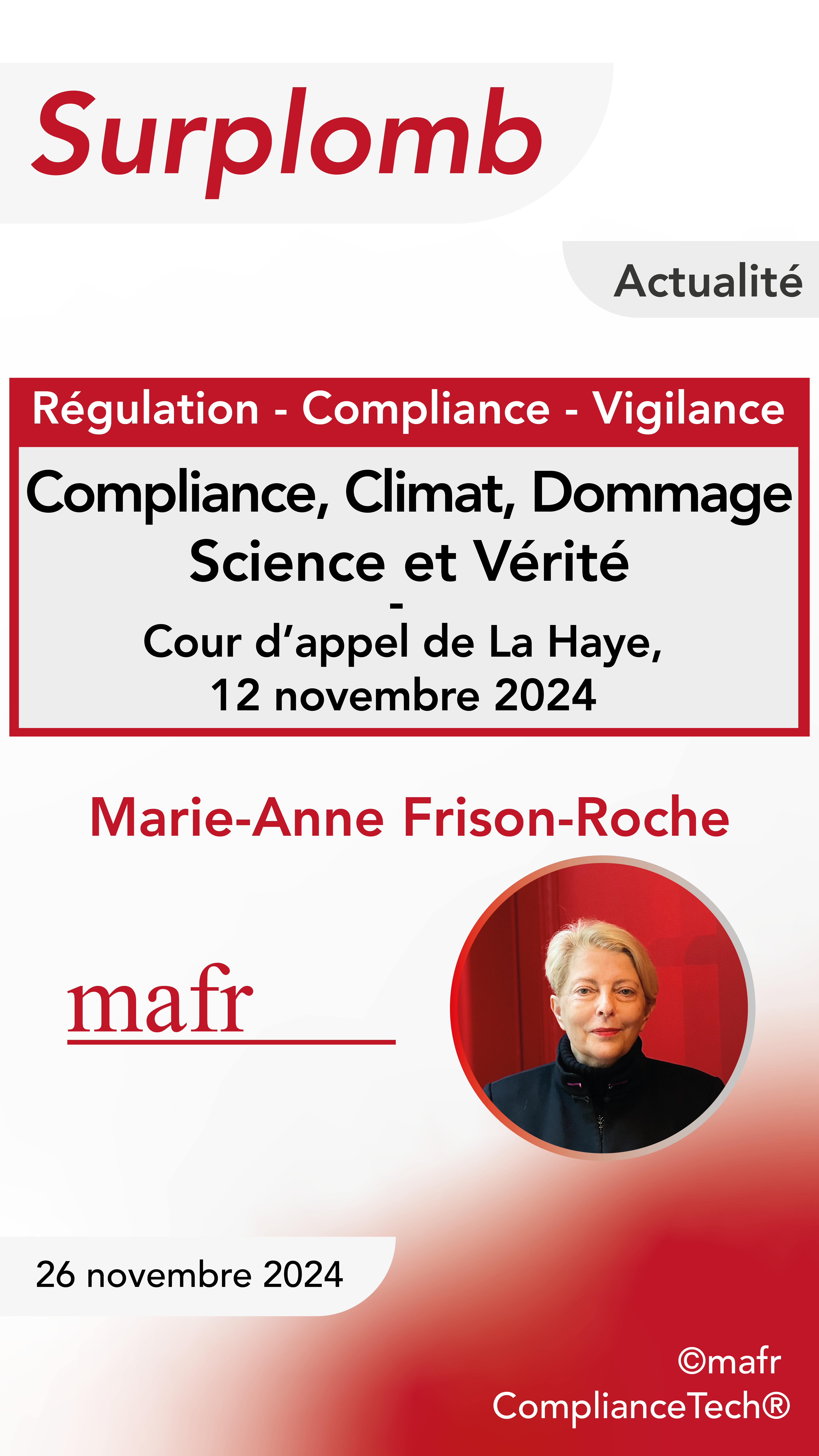

Nov. 12, 2024
Thesaurus : 09. Juridictions étrangères
► Référence complète : Gerechtshof Den Haag (Cour d'appel de La Haye), 12 novembre 2024, n° 200.302.332/01, Shell Plc c/ Milieudefensie et a.
____
____
🏛️lire la traduction de la décision (en anglais)
____
____
____
________
Oct. 10, 2024
Interviews
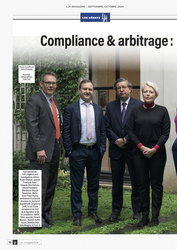
🌐follow Marie-Anne Frison-Roche on LinkedIn
🌐subscribe to the Newsletter MAFR. Regulation, Compliance, Law
🌐subscribe to the Newsletter Surplomb, by MAFR
____
► Full Reference: M.-A. Frison-Roche, E. Silva Romero, G. Filhol, V. Autret, B. Sillaman et K. Hennessee, Compliance & arbitrage : les prémices d’une symbiose, propos recueillis par O. Delaunay, LJA Magazine, septembre-octobre 2024, pp. 12-20
____
💬read the collective interview (in French)
____
🌐read the presentation of this interview on LinkedIn
____
► Topics covered during this collective interview:
-
The development of Compliance in an international environment
-
The Arbitrator and the concept of Compliance
-
Linking Arbitration and Compliance systems
____
► Summary of my interventions: Compliance Law appears to be developing in the context of international trade and Arbitration.
For my part, I placed particular emphasis on the fact that the first reports were the result of "negative reports" between Compliance and Arbitration, through Criminal Law and the obligation of arbitrators to ensure that they don't give effectivity to pacts of corruption. But the future lies in a more 'positive' and fruitful relationship between this new branch of law, Compliance Law, and the solid prospect offered by Arbitration, in that the arbitrator, this natural judge of international trade, will be able to support the contractualisation of Compliance obligations, particularly about due diligences in structural chains of activities and duty of vigilance.
Thus competent, the international arbitrator must respond to what the Monumental Goals in which Compliance Law is rooted expect of him/her: to provide solutions and remedies to issues that often concern an entire chain of activity or an entire sector in a more systemic perspective than in a traditional conception. This applies not only to investment arbitration, but also, for instance, to infrastructure arbitration. The concern for sustainability and the systemic perspective must be integrated into the reasoning and produce appropriate case law, a sort of new doctrine in the arbitration order, that will make more attractive the arbitration place that will most solidly link the skills of specialists in Compliance Law and Arbitration Law.
________
Oct. 1, 2024
Thesaurus : 02. Cour de cassation
► Référence complète : Crim., 1er oct. 2024, n° 23-81.328
____
____
🌐Lire le commentaire fait de cet arrêt
________
Sept. 2, 2024
Thesaurus : Convention, contract, settlement, engagement
► Référence complète : Convention judiciaire d'intérêt public en matière environnementale (CJIP) entre le Procureur de la République près le Tribunal judiciaire d'Epinal et la société Nestlé Waters Supply Est SAS, 2 septembre 2024, dite "CJIP Nestlé Waters"
____
____
____
____
____
📝commentaires de la CJIP :
- Dalloz actualité, 30 sept. 2024, obs. V. Fihol
________
June 22, 2024
Thesaurus : Soft Law
► Référence complète : Autorité de contrôle prudentiel et de résolution (ACPR), Les assureurs français face aux risques liés à la perte de biodiversité : Enjeux et enseignements pour les organismes et leur supervision, Étude, juin 2024.
____
________
June 13, 2024
Thesaurus : 06.1. Textes de l'Union Européenne
► Full Reference: Directive (EU) 2024/1760 of the European Parliament and of the Council of 13 June 2024 on corporate sustainability due diligence and amending Directive (EU) 2019/1937 and Regulation (EU) 2023/2859 (CS3D)
____
► read the text of the directive
____
📧see on LinkedIn the article published by Marie-Anne Frison-Roche in the Newsletter MAFR. Regulation, Compliance, Law, on the occasion of the publication of this directive in the Official Journal of the European Union
________
June 12, 2024
Conferences

🌐follow Marie-Anne Frison-Roche on LinkedIn
🌐subscribe to the Newsletter MAFR Regulation, Compliance, Law
____
► Full Reference: M.-A. Frison-Roche, Participation in the panel "Une Gouvernance responsable : vers un mieux vivre ensemble ?" ("Responsible governance: towards a better way of living together"), in Grenelle du Droit 5. L'avenir de la filière juridique, Association française des juristes d'entreprise ("The future of the legal profession"), AFJE), Cercle Montesquieu and Paris Panthéon-Sorbonne University, Campus Port-Royal Université Paris 1 Panthéon-Sorbonne, 1 rue de la Glacière, 75013 Paris, June 12, 2024
____
🧮See the full programme of this event (in French)
____
🎥watch the interview made just after this round-table discussion (in French)
____
🪑🪑🪑🪑🪑 will also be taking part in this round-table discussion:
🕴️Yves Garagnon, Chairman of Dilitrust,
🕴️Pierrick Le Goff, lawyer, partner at De Gaulle Fleurance,
🕴️Sabine Lochmann, Chairman of Ascend,
🕴️Vincent Vigneau, President of the Commercial, Economic and Financial Chamber of the Cour de cassation (French Judicial Supreme Court)
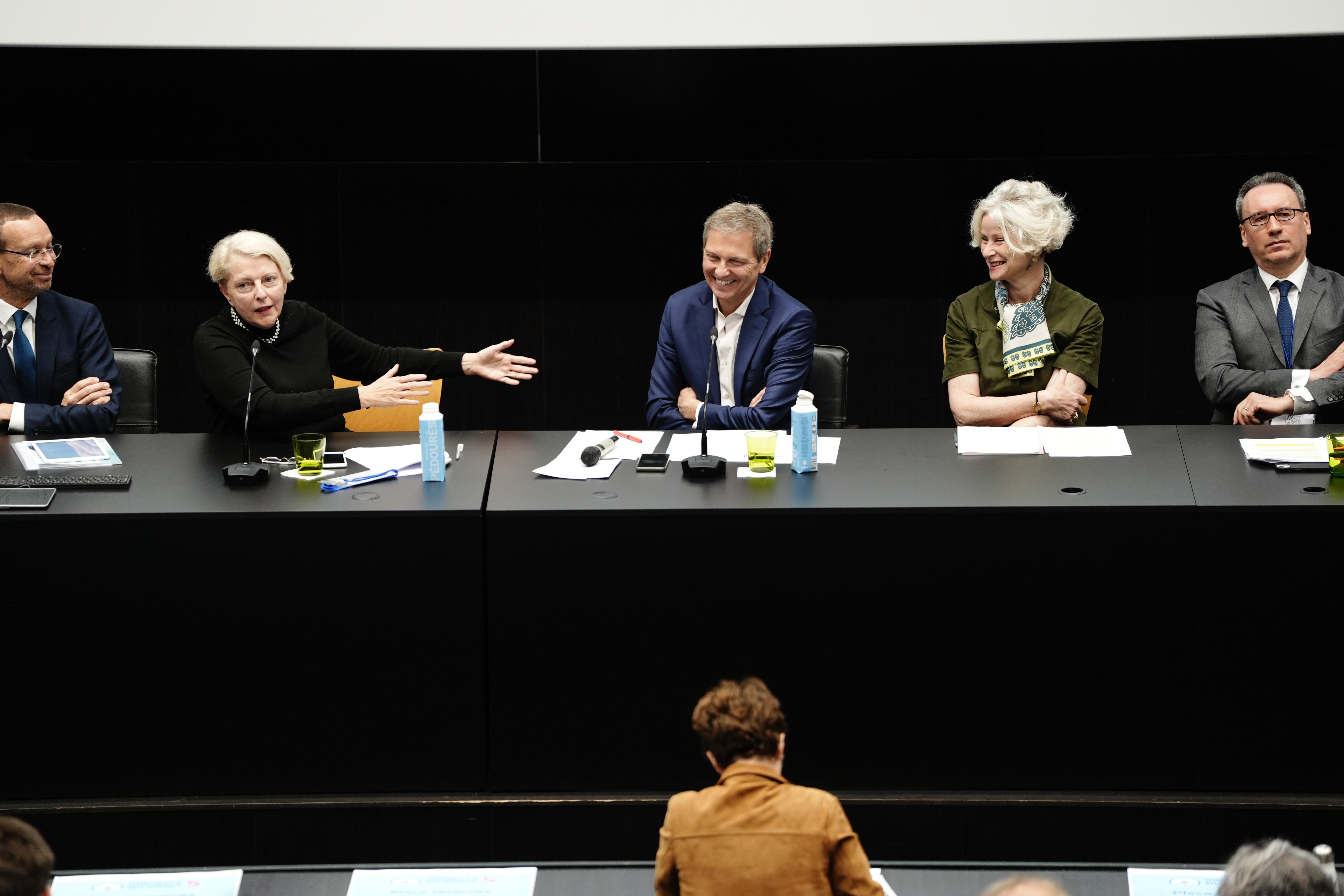
____
► English presentation of my intervention in this event's opening plenary round-table: In this plenary round table which opens the event, devoted to the theme of 'responsible corporate governance', for my interventions based on my work I will have the opportunity to address more particularly these different perspectives:
- How the new Compliance Law, which gives concrete expression to the responsibility of enterprises in a new relationship with States and with civil society, constitutes a 'legal revolution
- 💡for the record, mafr,📝Compliance Law, 2016 ; (ed.) 📘Compliance Monumental Goals, 2022
- how the judgment handed down by the Tribunal judiciaire de Paris (Paris First Instance Civil Court) on 28 February 2023 (Total Ouganda case) is remarkable and already constitutes a turning point in case law
- 💡for the record, mafr, 🎤audition as amica curiae, hearing of 26 October 2022 before the first instance Paris Court; (ed)📘Compliance Jurisdictionalisation, 2024
- how the relationship between States and enterprises is being renewed by this profound legal movement expressed by Compliance Law
- 💡for the record, mafr et M. Boissavy (ed.), 📕Compliance et droits de la défense - Enquêtes internes, CJIP, CRPC, mafr (dir.), 📘 Compliance Obligation, 2025
- how internal lawyers have a decisive and central role to play in this movement, particularly in the mechanism of vigilance / corporate sustainability due diligence, the "cutting edge" of Compliance Law,
- 💡for the record, mafr, 📝Contract of Compliance, Compliance stipulations, 2023 ; (ed.), 📘Compliance and Contract, 2025
- what is meant by the "Ex Ante responsibility" of enterprises, which does not necessarily entail their Ex Post liability, a distinction which lawyers are the guardians of
- 💡for the record, mafr, 📝La responsabilité Ex Ante, pilier du Droit de la Compliance ("Ex-Ante Responsability, Compliance Law Pillar"), 2021
- how European Compliance Law is profoundly humanist, an identity that distinguishes European Compliance from American Compliance and, above all, from Chinese Compliance.
- 💡for the record, mafr (ed.), 📕Pour une Europe de la Compliance ("For the Europe of the Compliance"), 2017
________
read the article about this round table written by Delphine Bauer in Actu-Juridique (in French)
April 2, 2024
Conferences
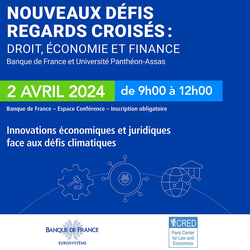
🌐follow Marie-Anne Frison-Roche on LinkedIn
🌐subscribe to the Newsletter MAFR Regulation, Compliance, Law
____
► Full Reference: M.-A. Frison-Roche, "Les voies d'innovations juridiques face aux nouveaux "défis climatiques" ("Innovative legal solutions to the new "climate challenges""), in C. Arnaud, O. de Bandt et B. Deffains (dir.), Nouveaux défis - Regards croisés : Droit, Économie et Finance. Quel Droit face au Changement Climatique ? (("New challenges - Crossed perspectives : Law, Economics and Finance. What Law in the Face of Climate Change?"), Banque de France (French Central Bank) and CRED/Paris Panthéon-Assas University, Paris, Centre de Conférence de la Banque de France, April 2, 2024
____
🧮See the full programme of this event
____
🔲see the slides, basis of this conference (in French)
____
► Summary of this conference: In response to the question of how the Law can produce 'innovations' to meet the 'climate challenges', the process is based on the three traditional sources of Law, which are, firstly, laws and regulations, secondly, the commitments of individuals, mainly contracts, and thirdly, court rulings.
At first sight, the Law in its traditional conception and practice is weak in the face of climate change. This weakness is inherent in the nature of climate change, which is at once future, global and systemic, in the face of these three sources of Law, which do not address all three dimensions at once. The scale of the legal innovation required to ensure that one or more articulated sources can grasp the future, the global and the systemic is therefore clear. And yet this is what is happening.
As far as laws and regulations are concerned, they do not seem very appropriate because they are, by their very nature, a territorial limit, and international treaties are very difficult to negotiate. The interweaving of European regulations, for example the CSRD and the CS3D, which mirror each other, may be more effective. As far as 'commitments' are concerned, a concept which in Law is not very precise outside of contracts and liability cases📎
But a major change has occurred with the emergence of a new branch of law: the Compliance Law, a teleological branch of Law whose legal normativity is lodged in the Monumental Goals📎
In this global, systemic, extraterritorial perspective, the object of which is the future - Compliance Law is, moreover, rejected by many legal experts - the legislative innovation is major. Indeed, the law of 23 March 2017, known as "Vigilance" designated large companies, because they are "powerful", because they are "in a position to act" to "detect and prevent" breaches of the environment and human rights. The 2017 law copied the "compliance tools"📎
Only large companies are subject to the Compliance Law, notably the Vigilance Law, since they are the only ones in a position to act, in this case "parent companies or principals", and borders are no longer limits since the obligation, creating personal liability for the company📎
On the second point, that of commitments, we are only at the beginning. Judges do not transform ethical statements into "unilateral legal commitments", and vigilance does not transform company law into co-management. But contracts do form a global network through which companies adjust their various legal obligations. This is why arbitrators, the only "global judges", will soon be involved in this systemic litigation📎
But the most innovative aspect undoubtedly comes from the courts. Perhaps and notably in France because it is from where we least expect it, the civil courts, that the imagination comes, but also the guarding of the great principles of the Rule of Law, because for the moment the case law is reasonable. This innovation has not come about proprio motu: the judges are not taking action, it is the NGOs that are conducting a kind of litigation policy, systematically giving formal notice to the major energy companies, but also to the major banks and insurers on climate issues, alleging non-compliance with their vigilance plans. The interim relief judge at the Paris Court of First Instance must then provide answers in systemic disputes, of which the so-called "Total Uganda"📎
The courts are demonstrating a great deal of innovation. The Court of First Instance's interim relief judge has appointed amici curiae📎
In conclusion, Law is in the process of being rebuilt through a new branch of Law, Compliance Law, whose the very purpose, as an extension of and going beyond Regulatory Law📎
________
🕴️M.-A. Frison-Roche, 📝What a commitment is, in 🕴️M.-A. Frison-Roche (ed.), 📘Compliance Obligation, 2024.
🕴️M.-A. Frison-Roche, 📝Compliance Monumental Goals, beating heart of Compliance Law, in 🕴️M.-A. Frison-Roche (ed.), 📘Compliance Monumental Goals, 2023.
🕴️M.-A. Frison-Roche (ed.), 📘Compliance Tools, 2021.
🕴️M.-A. Frison-Roche (ed.), 📘Compliance Obligation, 2024, of which a chapter is dedicated to "International Arbitration in support of the Compliance Obligation".
🕴️M.-A. Frison-Roche, 🚧Compliance contract, compliance clauses, 2022 ; 🕴️M.-A. Frison-Roche (ed.), 📘Contrat and Contract, 2024.
🕴️N. Cayrol, 📝L'amicus curiae, mesure d'instruction ordinaire, 2022.
On the creation on the new 5-12 Chamber, Contentieux émergent – Devoir de vigilance et responsabilité écologique see 🕴️J. Boulard, 💬Contentieux systémique : "Il est important, pour les magistrats, de rester au plus près des réalités" (Systemic litigation: "It is important for judges to remain as close as possible to reality"), March 28, 2024.
🕴️M.-A. Frison-Roche, 💬"Nous voyons émerger aujourd’hui le contentieux systémique" ("We are now seeing the emergence of the Systemic Litigation"), March 28, 2024 ; 🕴️M.-A. Frison-Roche, Coordination and animation of cycle of conference-debates 🧮Contentieux Systémique Émergent (Emerging Systemic Litigation).
🏛️Conseil d'État (French Council of State) and 🏛️Cour de cassation (French Court of cassation), 📗De la régulation à la compliance : quel rôle pour le juge ? (From Regulation to Compliance: what role for the Judge?), 2024; 🕴️M.-A. Frison-Roche, 🚧The deployment of Regulatory Law through Compliance Law in the European project, 2023 ; 🚧Compliance Law loses the ties of Regulation Law but retains its principles : consequences for companies, 2018 ; 🚧From Regulation Law to Compliance Law, 2017.
🕴️M.-A. Frison-Roche, 📝Le rôle du juge dans le déploiement du droit de la régulation par le droit de la compliance et ;🕴️Fr. Ancel, 📝Quel rôle pour le juge aujourd’hui dans la compliance ? Quel office processuel du juge dans la compliance ?, in 🏛️Conseil d'État et 🏛️Cour de cassation, 📗De la régulation à la compliance : quel rôle pour le juge ?, 2024 ; 🕴️Fr. Ancel, 📝Le principe processuel de compliance, un nouveau principe directeur du procès ?, in M.-A. Frison-Roche (dir.), 📕La juridictionnalisation de la Compliance, 2023 ; 🕴️M.-A. Frison-Roche, 📝Le Juge requis pour une Obligation de Compliance effective, in 🕴️M.-A. Frison-Roche (dir.), 📕L'Obligation de Compliance, 2024.
Dec. 12, 2023
Conferences

► Référence complète : M.-A. Frison-Roche, enregistrement et animation d'une série d'entretiens sur le Droit de la Compliance, in J.-Ph. Denis, Fenêtres ouvertes sur la gestion, Xerfi Canal, tenus le 12 décembre 2023, diffusés en 2024.
____
► Présentation générale de la série, comprenant les entretiens successifs : 🧱Compliance - un sujet de choix pour nouer Droit et Gestion : La distinction des disciplines est justifiée, le droit d'une part, la gestion d'autre part : c'est maltraiter la réalité que, notamment, de dissoudre l'une dans l'autre (ce que Jankélévitch appelait "la réduction par déplacement d'une discipline") car chacune doit conserver son ancrage.
Ceci posé, parce que la réalité ne se construit suivant les disciplines, si l'on veut rendre compte de celle-ci, ou au moins en tenir compte, par exemple de la réalité des entreprises, il faut que les disciplines se croisent.
La compliance est un parfait terrain pour cela.
Merci à Jean-Philippe Denis, professeur de gestion, qui est depuis toujours ouvert à ce dialogue, de l'avoir concrétisé plus encore, en permettant une série d'interviews à la croisée du Droit et de la Gestion sur le média Xerfi Canal.
____
Dans un premier temps, 4 discussions ont été tenues entre Jean-Philippe Denis et moi-même sur les thèmes suivants :
- 🎬sur la nécessité pratique de faire converger l'analyse juridique et l'analyse de gestionnaire lorsqu'il s'agit de comprendre, maîtriser, promouvoir la compliance (diffusé le 23 septembre 2024) : cliquer ICI
- 🎬sur l'existence de différents systèmes de compliance selon les zones du mondes
- 🎬sur la "civilisation" de la Compliance
- 🎬sur le fait que la Vigilance est la pointe avancée de la Compliance (diffusé le 13 juin 2024) : cliquer ICI
Puis, dans un second temps
- 🎬avec 🕴️Jean-Baptiste Racine sur la manière dont l'arbitrage international est apte aujourd'hui à défendre les Buts Monumentaux de la Compliance, notamment les droits humains et les impératifs environnementaux.
- 🎬avec 🕴️Stanislas Pottier de la façon dont les entreprises intègrent cet impératif de compliance, notamment dans sa dimension environnementale, participent à la construction européenne par cette voie, et arrivent à faire connaissance avec ce personnage assez nouveau pour elle, au moins en France : le juge (diffusé le 27 avril 2024) : cliquer ICI
- 🎬 avec 🕴️Roch-Olivier Maistre du rôle que joue l'Arcom dans le nouveau système numérique qui se met en place, et quelle articulation se noue entre la Régulation et la Compliance, notamment pour mesurer en quoi la Compliance est un outil utile pour assurer une meilleure supervision des plateformes en ligne et lutter ainsi plus efficacement contre les phénomènes de manipulation de l’information et de haine en ligne (diffusé le 16 mars 2024) : cliquer ICI
- 🎬avec 🕴️Eduardo Silva-Romero de l'importance grandissante de l'arbitrage international pour les entreprises, arbitrage qui intègre les intérêts des États et répond aux impératifs de Compliance (diffusé le 27 avril 2024) : cliquer ICI
- 🎬avec 🕴️Christophe Lapp de la nécessité pratique de ne pas confondre la Compliance avec la simple conformité, notamment lorsque le juge est saisi, les Buts Monumentaux étant intégrés dans son raisonnement (diffusé le 3 février 2024) : cliquer ICI
- 🎬avec 🕴️Jacques Beyssade du rapport entre la gouvernance et la Compliance, illustré dans une banque mutualiste et plus particulièrement dans le recrutement et la promotion des femmes à des postes de responsabilité (diffusé le 24 février 2024) : cliquer ICI
____
____
🔓consulter ci-dessous une présentation de chaque interview mené avec un expert en Droit sur un sujet particulier de Droit de la Compliance⤵️
Oct. 27, 2023
Thesaurus : 01. Conseil constitutionnel

► Full Reference: Conseil constitutionnel (French Constitutional Council), October 27, 2023, No. 2023-1066 QPC, Association Meuse nature environnement et autres
____
🏛️read the decision (in French)
________
Oct. 19, 2023
Thesaurus : Doctrine
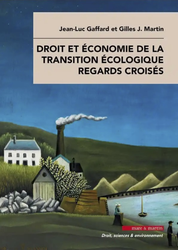
► Référence complète : J.-L. Gaffard & G. J. Martin (dir.), Droit et économie de la transition écologique. Regards croisés, Mare & Martin, coll. "Mare & Martin", 2023, 168 p.
____
____
____
► Résumé de l'ouvrage (fait par les auteurs) : "La transition écologique ne se décrète pas, elle se construit pas à pas. Le caractère irréductible de la contradiction entre activité humaine et préservation des éléments naturels ne saurait conduire à nier la complexité des rapports économiques et sociaux nécessaires pour y survivre. Au lieu d'énoncer un discours de vérité absolue que détiendrait un État omniscient ou le libre marché, le propos du présent ouvrage est d'ouvrir un débat démocratique dont l'objet est d'organiser le dissensus et de cultiver le compromis nécessaire pour rendre la transition viable. Pour répondre à ce défi, un regard croisé du Droit et de l'économie s'impose qui permet de souligner aussi bien la pluralité des ordres juridiques et des espaces normatifs que celle des ordres économiques au coeur desquels se trouve l'entreprise.".
________
Oct. 1, 2023
Thesaurus : Doctrine
► Référence complète : J.-C. Roda, "Les obligations environnementales et numériques pesant sur les entreprises : quelle gestion des risques concurrentiels ?", Revue Lamy de la concurrence, n°131, 1er octobre 2023, actualité 4501.
____
► Résumé de l'article (fait par l'auteur) : "Les entreprises cruciales sont aujourd'hui soumises à des obligations de plus en plus lourdes et qui concernent l'environnement et le numérique. Le franchissement de seuils de « taille » oblige désormais ces acteurs à se plier à la logique de la vigilance et de la compliance. De telles obligations ont un impact concurrentiel, surtout si l'on envisage les choses sous l'angle de la concurrence mondialisée. Comment, dès lors, les entreprises concernées peuvent-elles réagir, pour transformer la contrainte en un nouveau départ ? Celui-ci est-il envisageable ? Faut-il faire acte de résilience ou de résistance ?"
____
🦉Cet article est accessible en texte intégral pour les personnes inscrites aux enseignements de la Professeure Marie-Anne Frison-Roche
________
Sept. 28, 2023
Conferences
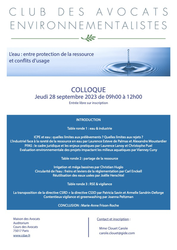
♾️follow Marie-Anne Frison-Roche on LinkedIn
♾️subscribe to the Newsletter MAFR Regulation, Compliance, Law
____
► Full Reference: M.-A. Frison-Roche, "Conclusion", in Club des avocats environnementalistes, L’eau : entre protection de la ressource et conflits d’usage, Maison des Avocats, Auditorium, September 28, 2023.
____
🧮see the full programme of this event
________
Sept. 7, 2023
Thesaurus : Doctrine
► Référence complète : F.-G. Trébulle, "L'accueil en droit des enjeux environnementaux, sociaux et de gouvernance", Rev. sociétés, 2023, pp. 471-482.
____
► Résumé de l'article (fait par l'auteur) : "À l'heure où l'on parle de plus en plus des enjeux environnementaux sociaux et de gouvernance en droit des sociétés et en droit financier, il apparaît nécessaire de replacer ce mouvement dans une perspective historique et spatiale pour mesure combien il s'agit d'une illustration ce que l'on pourrait décrire à la fois comme un renouvellement paradigmatique et une manifestation de l'évidence de la nécessité d'un renouveau du rapport du droit aux conséquences des activités menées. L'accueil en droit des enjeux ESG relève peut-être tout simplement de la nécessité et de l'évidence."
___
🦉Cet article est accessible en texte intégral pour les personnes inscrites aux enseignements de la Professeure Marie-Anne Frison-Roche
________
Sept. 7, 2023
Thesaurus : Doctrine

► Full Reference: M. Torre Schaub, A. Stevignon and B. Lormeteau (ed.), Les risques climatiques à l'épreuve du droit, Mare & Martin, coll. "Collection de l'Institut des sciences juridique et philosophique de la Sorbonne", 2023, 362 p.
____
► read the table of content (in French)
____
► read the backcover (in French)
____
► Summary of the book (done by the publisher, in French): "Le présent ouvrage explore l’appréhension juridique d’un nouveau concept : le « risque de transition », concept découlant du changement climatique. En effet, le phénomène du changement climatique crée et amplifie des aléas qui sont à l’origine de plusieurs périls encore peu considérés par le droit (risques contentieux, financiers et réglementaires). Pour assurer la pérennité de nos sociétés, toutes les dimensions de ces dangers doivent être identifiées et traitées. Les contributions proposées ont pour objectif de dresser une typologie des risques climatiques et de présenter des pistes juridiques pour y faire face. À l’échelon global, national et territorial, se pose la question de la reformulation de la responsabilité des États, mais également des acteurs privés (entreprises, banques, sociétés d’investissement), face aux aléas non maîtrisés. De nouvelles législations et réglementations internationales, européennes et nationales émergent, tendant à aborder ces risques. Cet ouvrage en fait état, ainsi que des développements contentieux climatiques inédits que s’y rattachent.".
____
📝read the article of Marie-Anne Frison-Roche : "Droit de la compliance et climat. Pour prévenir le risque et construire l'équilibre climatiques" ("Compliance Law and climate. Prevent the climate risk and build the climate balance")
________
Sept. 7, 2023
Publications

🌐follow Marie-Anne Frison-Roche on LinkedIn
🌐subscribe to the Newsletter MAFR Regulation, Compliance, Law
____
► Full Reference: M.-A. Frison-Roche, "Droit de la compliance et climat. Pour prévenir le risque et construire l'équilibre climatiques" ("Compliance Law and climate. Prevent the climate risk and build the climate balance"), in M. Torre Schaub, A. Stevignon and B. Lormeteau (ed.), Les risques climatiques à l'épreuve du droit, Mare & Martin, coll. "Collection de l'Institut des sciences juridique et philosophique de la Sorbonne", 2023, pp.73-83
____
📝read the article (in French)
____
🚧read the bilingual Working Paper which is the basis of this article, with additional developments, technical references and hyperlinks
____
► Summary of the article: Compliance Law is beginning to emerge in climate topic, through the expression "Climate Compliance Law", but the climate issue itself is the most perfect example of why General Compliance Law is made for. It is indeed a new branch of Law, a global Law claiming to provide Ex Ante solutions here and now for global issues, so that in the future systemic catastrophies will not occur, will not happen: it is these "Monumental Goals" that give meaning, coherence, and simplicity to Compliance Law.
Compliance Law, linked to the Rule of Law principle, makes it possible to go beyond the choice often presented between the effectiveness of the protection of the planet and the renunciation of freedoms, in particular the freedom to do business and the freedom of individuals, especially the protection of their data.
Climate is thus exemplary of the object of Monumental Goals of Compliance Law (I). The systemic risk that it now constitutes is analogous to Banking or Digital Systemic Risks and therefore calls for the application of identical legal Compliance Tools, formerly put in place for Banking Regulatory and Compliance Law, recently invented for Digital. Compliance Law, extending Regulation Law, itself from the precondition of the Sector and the Territory, is therefore the branch which makes it possible to put in place new legal solutions, either by force (judicial agreements, compliance programs, etc.), or by will (commitments, global charters, etc.).
Therefore, an alliance can exist between political and public authorities, and crucial economic operators (II), that the rise in power of the "raison d'être" is the sight and whose technical challenge is the collection of information that must be put in correlation. Scientists pooling Information, this public good, provided by public and private entities. The courts are at the center of this articulation between Compliance Law and Climate, which object is the Future.
________
May 31, 2023
Thesaurus : 06.1. Textes de l'Union Européenne
► Full Reference: Regulation (EU) 2023/1115 of the European Parliament and of the Council of 31 May 2023 on the making available on the Union market and the export from the Union of certain commodities and products associated with deforestation and forest degradation and repealing Regulation (EU) N° 995/2010.
____
________
May 20, 2023
Newsletter MAFR - Law, Compliance, Regulation
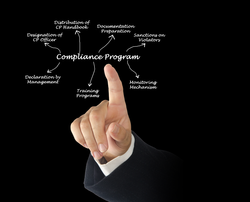
♾️ follow Marie-Anne Frison-Roche on LinkedIn
♾️ subscribe to the Newsletter MAFR Regulation, Compliance, Law
____
► Full Reference: M.-A. Frison-Roche, "Le PNF devrait avoir ouvertement compétence en matière de CJIP environnementale : la CJIP "Guy Dauphin Environnement" du 17 mai 2023" ("The French National Financial Prosecutor’s Office should have open jurisdiction over environmental Judicial Public Interest Agreement: the "Guy Dauphin Environnement" Judicial Public Interest Agreement of 17 May 2023"), Newsletter MAFR Law, Compliance, Regulation, 20 May 2023.
____
📧Read by freely subscribing other news of the Newsletter MAFR - Law, Compliance, Regulation
____
🔴 The Judicial Public Interest Agreement GDE of 15 May 2023 or how the French National Prosecutor's Office is rightly meddling in Environmental Compliance
The Parquet National Financier (French National Financial Prosecutor’s Office) does not have jurisdiction over environmental matters, and this is regrettable. For it is very well placed to obtain, in particular for the benefit of associations, adequate measures for the future, which refers to the definition of Compliance Law. This is what he is actually achieving through the Convention judiciaire d'intérêt public - CJIP (Judicial Public Interest Agreement) GDE.
____
📧read the article ⤵️
May 10, 2023
Thesaurus : 03. Conseil d'Etat
► Full Reference: Conseil d'État (French Council of State), 6th and 5th chambers reunited, 10 May 2023, n° 467982, Commune de Grande-Synthe (so-called Grande-Synthe III).
____
🏛️read the decision (in French)
________